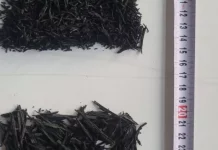JINAN: Shoals of fish gather curiously around cameras in a marine farm, their actions projected onto a large LED screen together with real-time data for investors to reference as they ponder their next deals.
The farm, screen and big data technology belong to Yantai CIMC Blue Ocean Technology Co., Ltd., which is located in Yantai, a coastal city in east China’s Shandong Province. They are a testament to the transformation and informatization China’s fishing industry has undergone over past decades.
“In the past, we could only check the growth of fish by diving underwater, but now staff can monitor what is happening in the sea from their offices using the underwater camera system,” said Li Hong, deputy general manager of the company. Li said that hundreds of sensors installed in the farm can facilitate the collection and remote transmission of data to reflect equipment operations, feeding conditions and environmental situations. Based on the internal system’s data services, the company can share its data with fish owners, financial and insurance institutions, governmental departments and marine research institutes, in a bid to help all parties in their decision-making processes. Since the mid-20th century, marine ecosystems in most coastal areas of Shandong have suffered disruptions due to overfishing and the deterioration of coastal environments, posing threats to fish sources.
Today, however, ocean farming technology has ushered in a new era for the modern fishing industry. The traditional fishing economy is now undergoing high-quality development. “The old pattern of fish farming was not only time-consuming, but led to high labor costs as well. Now we only need four employees to breed 1,000 tonnes of adult fish using the platform, and the fish culture cycle is down from three years to one year,” said Chen Degang, CEO of the Changdao Hongxiang Seafood Production Corporation.–Agencies






